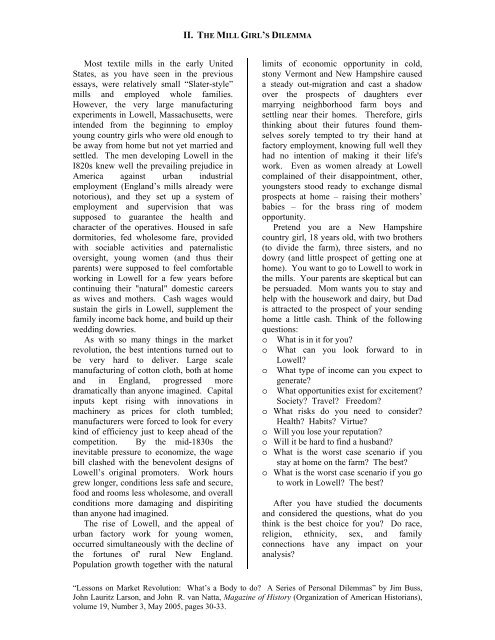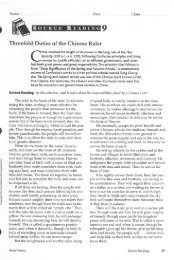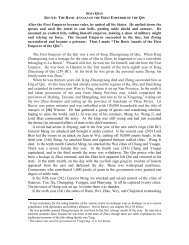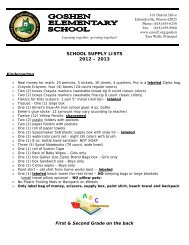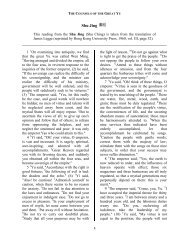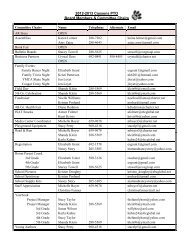The Mill Girl's Dilemma
The Mill Girl's Dilemma
The Mill Girl's Dilemma
Create successful ePaper yourself
Turn your PDF publications into a flip-book with our unique Google optimized e-Paper software.
II. THE MILL GIRL’S DILEMMA<br />
Most textile mills in the early United<br />
States, as you have seen in the previous<br />
essays, were relatively small “Slater-style”<br />
mills and employed whole families.<br />
However, the very large manufacturing<br />
experiments in Lowell, Massachusetts, were<br />
intended from the beginning to employ<br />
young country girls who were old enough to<br />
be away from home but not yet married and<br />
settled. <strong>The</strong> men developing Lowell in the<br />
I820s knew well the prevailing prejudice in<br />
America against urban industrial<br />
employment (England’s mills already were<br />
notorious), and they set up a system of<br />
employment and supervision that was<br />
supposed to guarantee the health and<br />
character of the operatives. Housed in safe<br />
dormitories, fed wholesome fare, provided<br />
with sociable activities and paternalistic<br />
oversight, young women (and thus their<br />
parents) were supposed to feel comfortable<br />
working in Lowell for a few years before<br />
continuing their "natural" domestic careers<br />
as wives and mothers. Cash wages would<br />
sustain the girls in Lowell, supplement the<br />
family income back home, and build up their<br />
wedding dowries.<br />
As with so many things in the market<br />
revolution, the best intentions turned out to<br />
be very hard to deliver. Large scale<br />
manufacturing of cotton cloth, both at home<br />
and in England, progressed more<br />
dramatically than anyone imagined. Capital<br />
inputs kept rising with innovations in<br />
machinery as prices for cloth tumbled;<br />
manufacturers were forced to look for every<br />
kind of efficiency just to keep ahead of the<br />
competition. By the mid-1830s the<br />
inevitable pressure to economize, the wage<br />
bill clashed with the benevolent designs of<br />
Lowell’s original promoters. Work hours<br />
grew longer, conditions less safe and secure,<br />
food and rooms less wholesome, and overall<br />
conditions more damaging and dispiriting<br />
than anyone had imagined.<br />
<strong>The</strong> rise of Lowell, and the appeal of<br />
urban factory work for young women,<br />
occurred simultaneously with the decline of<br />
the fortunes of' rural New England.<br />
Population growth together with the natural<br />
limits of economic opportunity in cold,<br />
stony Vermont and New Hampshire caused<br />
a steady out-migration and cast a shadow<br />
over the prospects of daughters ever<br />
marrying neighborhood farm boys and<br />
settling near their homes. <strong>The</strong>refore, girls<br />
thinking about their futures found themselves<br />
sorely tempted to try their hand at<br />
factory employment, knowing full well they<br />
had no intention of making it their life's<br />
work. Even as women already at Lowell<br />
complained of their disappointment, other,<br />
youngsters stood ready to exchange dismal<br />
prospects at home – raising their mothers’<br />
babies – for the brass ring of modem<br />
opportunity.<br />
Pretend you are a New Hampshire<br />
country girl, 18 years old, with two brothers<br />
(to divide the farm), three sisters, and no<br />
dowry (and little prospect of getting one at<br />
home). You want to go to Lowell to work in<br />
the mills. Your parents are skeptical but can<br />
be persuaded. Mom wants you to stay and<br />
help with the housework and dairy, but Dad<br />
is attracted to the prospect of your sending<br />
home a little cash. Think of the following<br />
questions:<br />
o What is in it for you<br />
o What can you look forward to in<br />
Lowell<br />
o What type of income can you expect to<br />
o<br />
generate<br />
What opportunities exist for excitement<br />
Society Travel Freedom<br />
o What risks do you need to consider<br />
Health Habits Virtue<br />
o Will you lose your reputation<br />
o Will it be hard to find a husband<br />
o What is the worst case scenario if you<br />
stay at home on the farm <strong>The</strong> best<br />
o What is the worst case scenario if you go<br />
to work in Lowell <strong>The</strong> best<br />
After you have studied the documents<br />
and considered the questions, what do you<br />
think is the best choice for you Do race,<br />
religion, ethnicity, sex, and family<br />
connections have any impact on your<br />
analysis<br />
“Lessons on Market Revolution: What’s a Body to do A Series of Personal <strong>Dilemma</strong>s” by Jim Buss,<br />
John Lauritz Larson, and John R. van Natta, Magazine of History (Organization of American Historians),<br />
volume 19, Number 3, May 2005, pages 30-33.
II. THE MILL GIRL’S DILEMMA<br />
DOCUMENTARY EVIDENCE<br />
1. Below are some fragments of employment documents you might have seen.<br />
Help Wanted!<br />
“October 1, 1829<br />
“<strong>The</strong> subscribers are in want of<br />
Twenty-four good [female] Water Loom<br />
Weavers, to whom good wages will be<br />
given, part cash or all, if particularly<br />
required. None need apply unless they<br />
are willing to work twelve hours per-day<br />
[sic], and be subject to good rules and<br />
regulations while weaving.<br />
J. Underwood & Co.”<br />
room without sufficient reason–Nor<br />
allow any Person not employed in the<br />
Establishment to Visit his room without<br />
permission–“<br />
[Source: from an unnamed mill, in the<br />
Zachariah Allen Papers, Rhode Island<br />
Historical Society, reproduced in <strong>The</strong> New<br />
England <strong>Mill</strong> Village, ed. Kulick, Parks, and<br />
Penn, 464)<br />
[Source: Reproduced in Gary Kulik, Roger<br />
Parks, and <strong>The</strong>odore Z. Penn, eds., <strong>The</strong> New<br />
England <strong>Mill</strong> Village, 1790-1860<br />
[Cambridge, MA: <strong>The</strong> MIT Press, 1982],<br />
410.]<br />
Factory Rules<br />
“From 20th Septr to 20th March the<br />
Wheel Starts at Sunrise, Stops at half<br />
past Seven O Clock–One half hour is<br />
allowed for Breakfast–Three Quarters<br />
for Dinner–From 20th March to 20th<br />
Septr Starts at Sunrise & Stops at<br />
Sunset–One half hour is allowed for<br />
breakfast–One [Hour] for Dinner–It is<br />
expected every person will be at their<br />
places ready to work at the Starling of<br />
the Wheel, which will be at the above<br />
mentioned hours–Any Person being<br />
absent 15 Minutes after the Wheel is<br />
Started will have ¼ of a day deducted<br />
from their wages–<br />
“No person will leave the room under<br />
any pretence [sic] without permission<br />
from the Overseer.<br />
“<strong>The</strong> Overseer will pay particular<br />
attention to the hands under his charge,<br />
that they perform the Work allotd them–<br />
He will not permit them to leave the<br />
Employment Agreements with rates of<br />
pay, board, and terms of payment<br />
October 3, 1828<br />
“Chloe Bugbee agrees to<br />
recommence work at weaving in the old<br />
mill tomorrow morning and her sister<br />
Rhoda Bugbee agrees to commence at<br />
the same time to weave in the old mill.<br />
Both on the customary terms. Board at<br />
Thomas Richmonds’. Began as agreed.<br />
Rhoda chooses to weave 2 wks by the wk<br />
at 12/ [12 shillings = $2] then by the<br />
yard.”<br />
November 15,1828<br />
“Miss Louisa Packard agreed to go<br />
to weaving in the new mill week after<br />
visit on usual terms,, say 7 mills pr yard<br />
[7 cents per hundred yards] payable in<br />
board, 1/3 cash & residue in goods. To<br />
work by the yard from commencement &<br />
to stay if agreeable on six months at<br />
least, extras excepted.“<br />
[Source: from Pomfret Manufacturing<br />
Company Records, Connecticut State<br />
library, Hartford, reproduced in <strong>The</strong> New<br />
England <strong>Mill</strong> Village, ed. Kulik, Parks, and<br />
Penn, 449-50.]<br />
“Lessons on Market Revolution: What’s a Body to do A Series of Personal <strong>Dilemma</strong>s” by Jim Buss,<br />
John Lauritz Larson, and John R. van Natta, Magazine of History (Organization of American Historians),<br />
volume 19, Number 3, May 2005, pages 30-33.
II. THE MILL GIRL’S DILEMMA<br />
2. Rare personal letters further testify to the mill girls’ dilemma. <strong>The</strong> following excerpts trace the<br />
progress of a young women into and then again out of the mills.<br />
Sally Rice to her mother and father,<br />
Union Village New York, n.d. 1839<br />
[Rice is explaining why she cannot stay<br />
at home in the Vermont countryside but<br />
must try to find her way in the world by<br />
going out to work as a housekeeper.]<br />
“I have got so that by next summer if I<br />
could stay I could begin to lay up something<br />
. . . . Think of it all around I am now most<br />
19 years old I must of course have<br />
something of my own before many more<br />
years have passed over my head and where<br />
is that something coming from if I go home<br />
and earn nothing. What can we [get] of[f]<br />
of a Rocky farm only 2 or 3 cows. [I]t would<br />
be another thing if you kept 9 or 10 cows<br />
and could raise com to sell. It surely would<br />
be cheper [sic] for you to hire a girl that can<br />
do your work one that would be contented to<br />
stay in the desert than for me to come home<br />
and live in trouble all the time . . . . You<br />
may think me unkind but how can you blame<br />
me for wanting to stay here I have but one<br />
life to live and I want to enjoy my self as<br />
well as I can while I live. If I go home I can<br />
not have the privelage [sic] of going to<br />
me[e]ting [church] nor eny [sic] thing else."<br />
not like as well as I should housework and<br />
knowing you would not approve of my<br />
working in the mill. But when I considered<br />
that I had got myself to take care off I ought<br />
to do that way that I can make the most and<br />
save the most. I concluded to come and try .<br />
. . . I get along as well as eny [sic] one<br />
could expect. I think verry [sic] likely that<br />
before the year is out I shall be able to tend<br />
4 looms and then I can make more. 0 & P<br />
Alger [James Alger’s sisters] make 3 dollars<br />
a week besides their board. We pay 1,25.<br />
cts for our board. We 3 girls board with a<br />
Widow Whitemore. She is a first rate<br />
homespun woman. I like quite as well as I<br />
expected but not as well as I do house work.<br />
To be sure it is a noisy [plaIce and we are<br />
confined more than I like to be but I do not<br />
wear our my clothes and shoes as I do when<br />
I do house work. If I can make 2 dollars per<br />
week besides my board and save my clothes<br />
and shoes I think it will be better than to do<br />
house work for nine shillings. . . I mean for<br />
a year or two. I should not like to spend my<br />
days in a mill not by a good deal unless they<br />
are short because I like a Farm toto] well<br />
for that.”<br />
Sally Rice to her father, Masonville, CT<br />
Feb 23. 1845<br />
[She has moved again and taken up work<br />
in a textile factory]<br />
“Well knowing that you was dolefully<br />
prejudiced against a Cotton Factory, and<br />
being no less prejudiced myself I thought it<br />
best to wait and see how I prospered & also<br />
see whether I were going [to] stay or not. I<br />
well knew that if I could not make more in<br />
the mill than I can doing house work I<br />
should not stay. Now I will tell you how I<br />
happened to come. <strong>The</strong> Saturday after New<br />
Years I came to Masonville in Thompson<br />
Conneticut [sic] with James Alger on a visit<br />
to see his sister[s] who weave in the mill . . .<br />
. While here I was asked to come back and<br />
learn to weave. I did not fall in with the<br />
idea at all because I well knew that I should<br />
Sally Rice to her Father. Mother. Brother<br />
& Sister, <strong>Mill</strong>bury. MA Sep 14.1845<br />
[She has quit the mill and taken up<br />
housework again.]<br />
“You surely cannot blame me for leaving<br />
the factory so long as I realized [sic] that it<br />
was killing me to work in it. I went to the<br />
factory because I expected to earn more<br />
than I can at housework. To be sure I might<br />
if I had my health. Could you have seen me<br />
att [sic] the time or a week before I came<br />
away you would advise me as many others<br />
did to leave immediately. I realise [sic] that<br />
if I lose my health which is all I possess on<br />
earth . . . that I shall be in a sad condition.”<br />
[Source: <strong>The</strong> New England <strong>Mill</strong> Village, ed.<br />
Kulik, Parks, and Penn, 387-92.]<br />
“Lessons on Market Revolution: What’s a Body to do A Series of Personal <strong>Dilemma</strong>s” by Jim Buss,<br />
John Lauritz Larson, and John R. van Natta, Magazine of History (Organization of American Historians),<br />
volume 19, Number 3, May 2005, pages 30-33.
II. THE MILL GIRL’S DILEMMA<br />
3. One of our richest sources for understanding the mill girls dilemma is the Lowell<br />
Offering, a magazine published in Lowell comprising only articles and poems written<br />
by working girls themselves. <strong>The</strong> anonymous essay below purports to describe the<br />
happy mill girls work week. Read it carefully: is it a celebration or a protest<br />
“A Week in the <strong>Mill</strong>.” Anonymous.<br />
Lowell Offering. Volume V 1845<br />
“Much has been said of the factory<br />
girl and her employment. By some she<br />
has been represented as dwelling in a<br />
sort of brick- and-mortar paradise,<br />
having little to occupy thought save the<br />
weaving of gay and romantic fancies,<br />
while the spindle or the wheel flies<br />
obediently beneath her glance. Others<br />
have deemed her a mere servile drudge,<br />
chained to her labor by almost as strong<br />
a power as that which holds a bondman<br />
in his fetters; and, indeed, some have<br />
already given her the title of ‘the white<br />
slave of the North.’ Her real situation<br />
approaches neither one nor the other of<br />
these extremes. Her occupation is as<br />
laborious as that of almost any female<br />
who earns her own living, while it has<br />
also its sunny spots and its cheerful<br />
intervals, which make her hard labor<br />
seem comparatively pleasant and easy.<br />
“Look at her as she commences her<br />
weekly task. <strong>The</strong> rest of the sabbath has<br />
made her heart and her step light, and<br />
she is early at her accustomed place,<br />
awaiting the starting of the machinery.<br />
Every thing having been cleaned and<br />
neatly arranged on the Saturday night,<br />
she has less to occupy her on Monday<br />
than on other days; and you may see her<br />
leaning from the window to watch the<br />
glitter of the sunrise on the water, or<br />
looking away at the distant forests and<br />
fields, while memory wanders to her<br />
beloved country home; or, it may be that<br />
she is conversing with a sister-laborer<br />
near; returning at regular intervals to<br />
see that her work is in order.<br />
“Soon the breakfast bell rings; in a<br />
moment the whirling wheels are stopped,<br />
and she hastens to join the throng which<br />
is pouring through the open gate. At the<br />
table she mingles with a various group.<br />
Each dispatches the meal hurriedly,<br />
though not often in silence; and if, as is<br />
sometimes the case, the rules of<br />
politeness are not punctiliously observed<br />
by all, the excuse of some lively country<br />
girl would be, ‘<strong>The</strong>y don't give us time<br />
for manners.’<br />
“<strong>The</strong> short half-hour is soon over;<br />
the bell rings again; and now our factory<br />
girl feels that she has commenced<br />
her day’s work in earnest. <strong>The</strong> time is<br />
often apt to drag heavily till the dinner<br />
hour arrives. Perhaps some part of the<br />
work becomes deranged and stops; the<br />
constant friction causes a belt of leather<br />
to burst into a flame; a stranger visits<br />
the room, and scans the features and<br />
dress of its inmates inquiringly; and<br />
there is little else to break the monotony.<br />
<strong>The</strong> afternoon passes in much the same<br />
manner. Now and then she mingles with<br />
a knot of busy talkers who have collected<br />
to discuss some new occurrence, or<br />
holds pleasant converse with some<br />
intelligent and agreeable friend, whose<br />
acquaintance she has formed since her<br />
factory life commenced; but much of the<br />
time she is left to her own thoughts.<br />
While at her work, the clattering and<br />
rumbling around her prevent any other<br />
noise from her attention, and she must<br />
think, or her lift would be dull indeed.<br />
“Thus the day passes on, and evening<br />
comes; the time which she feels to be<br />
exclusively her own. How much is done<br />
in the three short hours from seven to ten<br />
o'clock. She has a new dress to finish; a<br />
call to make on some distant<br />
corporation; a meeting to attend; there<br />
is a lecture or a concert at some one of<br />
the public halls, and the attendance will<br />
be thin if she and her associates are not<br />
present; or, if nothing more imperative<br />
demands her time, she takes a stroll<br />
through the street or to the river with<br />
some of her mates, or sits down at home<br />
to peruse a new book. At ten o'clock all<br />
“Lessons on Market Revolution: What’s a Body to do A Series of Personal <strong>Dilemma</strong>s” by Jim Buss,<br />
John Lauritz Larson, and John R. van Natta, Magazine of History (Organization of American Historians),<br />
volume 19, Number 3, May 2005, pages 30-33.
II. THE MILL GIRL’S DILEMMA<br />
is still for the night.<br />
“<strong>The</strong> clang of the early bell awakes<br />
her to another day, very nearly the<br />
counterpart of the one which preceded<br />
it. And so the week rolls on, in the same<br />
routine, till Saturday comes. Saturday!<br />
the welcome sound! She busies herself<br />
to remove every particle of cotton and<br />
dust from her frame or looms, cheering<br />
herself meanwhile with sweet thoughts of<br />
the coming sabbath; and when, at an<br />
earlier hour than usual, the mill is<br />
stopped, it looks almost beautiful in its<br />
neatness.<br />
“<strong>The</strong>n approaches the sabbath–the<br />
day of rest! If the factory girl keeps it<br />
well, it must be at church; for there are<br />
some in every boarding-house who find<br />
an excuse for staying at home half the<br />
day at least. One of her roommates is<br />
indisposed; another says she must write<br />
a letter to her friends; another has to<br />
work so hard during the week that she<br />
thinks she ought to make this literally a<br />
‘day of rest,’ so that retirement and<br />
meditation are out of the question. But<br />
in the sabbath school and sanctuary her<br />
time is well spent. No one is more<br />
constant at church, or earlier in her<br />
seat, than the operative who has been<br />
trained to know the value of the<br />
institution of the gospel. <strong>The</strong><br />
instructions which she receives sink deep<br />
into her heart, giving her a fund of<br />
thought for the coming week. Her pastor<br />
and her sabbath school teacher are felt<br />
to be her best friends; and their kindness<br />
is a strong allurement to her spirit, often<br />
keeping her long from her less-favored<br />
home. If it is said that many a one has<br />
here found a grave, shall it not also be<br />
said that many a one has here found the<br />
path to Heaven<br />
“<strong>The</strong> writer is aware that this sketch<br />
is an imperfect one. Yet there is very<br />
little variety in an operative's lift, and<br />
little difference between it and any other<br />
lift of labor. It lies<br />
‘half in sunlight–half in shade.’<br />
“Few would wish to spend a whole<br />
life in a factory, and few are discontented<br />
who do thus seek a subsistence for<br />
a term of months or years.”<br />
[Transcription from: .]<br />
“Lessons on Market Revolution: What’s a Body to do A Series of Personal <strong>Dilemma</strong>s” by Jim Buss,<br />
John Lauritz Larson, and John R. van Natta, Magazine of History (Organization of American Historians),<br />
volume 19, Number 3, May 2005, pages 30-33.
II. THE MILL GIRL’S DILEMMA<br />
4. Finally, below find a few statistics that show the market pressures faced by textile<br />
manufacturers.<br />
TABLE 1. Price Index (Warren Pearson Index, 1910=100)<br />
Year Textiles Change All Goods Change<br />
1800 225 129<br />
1810 278 +53 131 +2<br />
1820 211 -67 106 -25<br />
1830 181 -30 91 -15<br />
1840 146 -35 95 +4<br />
1850 67 -79 84 -11<br />
1860 77 +10 93 +9<br />
Source: United States Bureau of the Census, <strong>The</strong> Statistical History of the United States,<br />
from Colonial Times to the Present (New York, Basic Books: 1976), 201-2.<br />
TABLE 2. Cotton Prices, 1800-1860<br />
Year<br />
Raw Cotton<br />
Cotton Sheeting<br />
(cents/pound)<br />
(cents/yd)<br />
1800 24 17<br />
1810 16 21<br />
1820 17 16<br />
1830 10 10<br />
1840 08 09<br />
1850 12 07<br />
1860 11 08<br />
Source: Ibid., 208-9.<br />
“Lessons on Market Revolution: What’s a Body to do A Series of Personal <strong>Dilemma</strong>s” by Jim Buss,<br />
John Lauritz Larson, and John R. van Natta, Magazine of History (Organization of American Historians),<br />
volume 19, Number 3, May 2005, pages 30-33.


